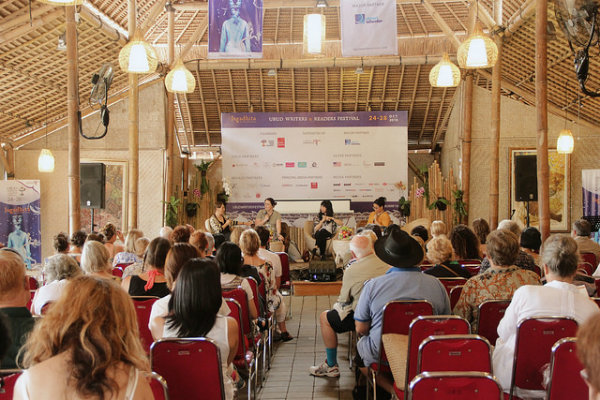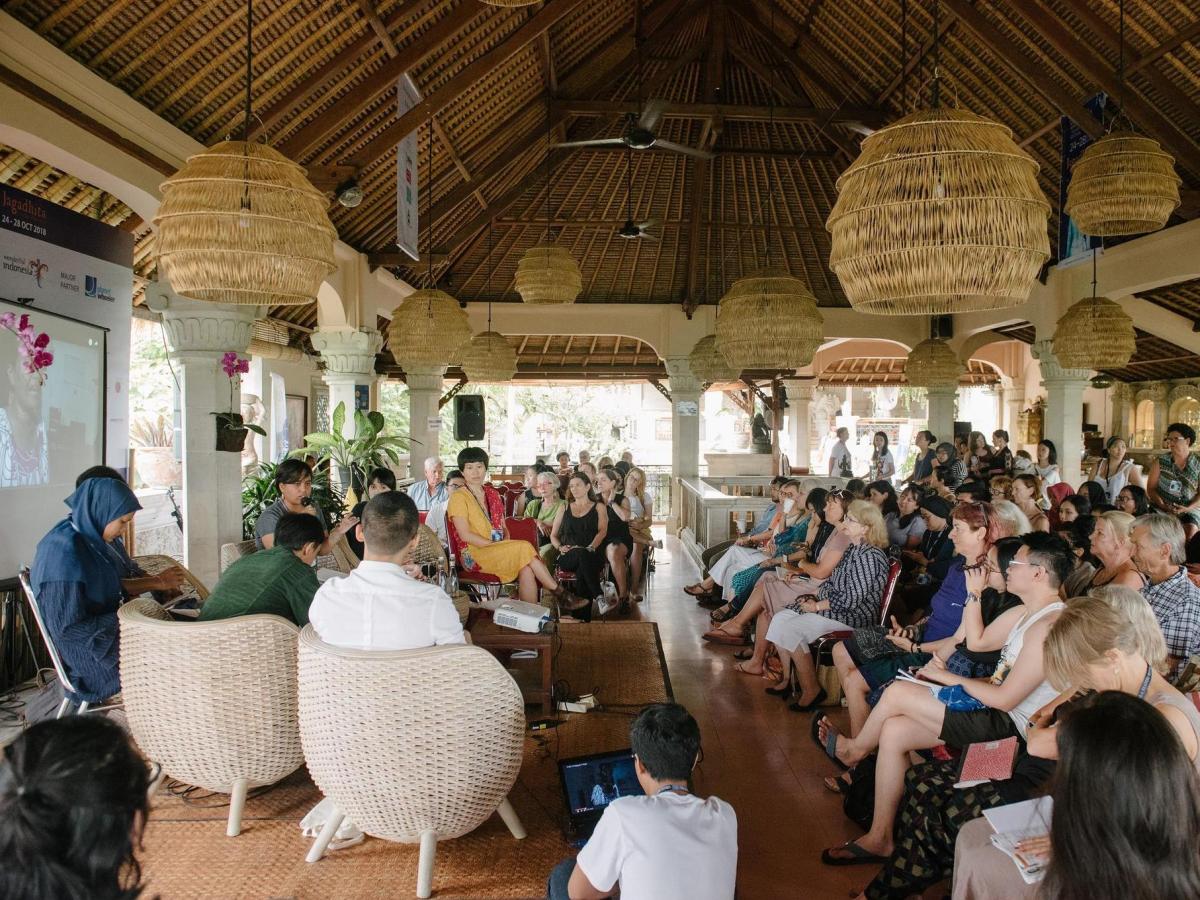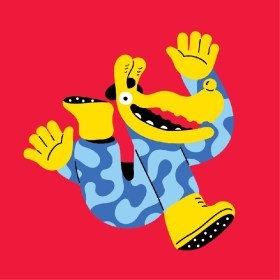Ubud Writers & Readers Festival, ‘Art for Impact’, 28 October, via flickr. Image credit: Wirasathya Darmaja.
It’s a steaming 75% humidity, nearly 32° Celsius and I’m at brunch with the Ubud Writers and Readers Festival (UWRF) founders, Janet DeNeefe and Ketut Suardana, at Casa Luna, one of their three restaurants in Ubud.
They are surrounded by a bunch of festival family on what is the final day of a five-day mastication of Jagadhita – ‘The World We Create’. The mood is sweaty and jovial, if a little exhausted, and we are singing happy birthday in Indonesian while cutting into a ceremonial rice cake, the tumpeng; a tall cone of yellow rice surrounded by seafood, vegetables and meats.
Here in Ubud this year there are over 180 speakers appearing in 240 events across 30 venues. The festival’s presence brings the town alive in a chattering contemplation of global perspectives and contemporary thinking. For five days the streets are filled with red-faced literary buffs sweating their way up the Ubud hills, being tempted by the ever-present cries of ‘Taxi’, ‘Transport?’ ‘Motorbike?’ from local drivers. By the time the festival closes we will have come away with reignited passions, new perspectives, strengthened resolve and far stronger thigh muscles.
Jagadhita is a Hindu phrase and a central part of traditional Balinese philosophy (Tri Hita Karana) representing the individual pursuit of harmony and prosperity. It’s a fitting and provocative theme for a writers’ festival populated by cultural exchange, difficult conversations, culinary immersion and of course peppered liberally with cocktail hours.
UWRF is the sort of festival where punters find themselves sitting next to acclaimed authors they’ve only fan-girled about, sharing a quiet coffee with world renowned panellists, or drinking cocktails while discussing world politics with a Nobel Prize winner. In the last four days I’ve had pasta with Gillian Triggs, cocktails with Hanif Kureishi, slurped mixed fruit frappes with Fatima Bhutto and listened to speeches side by side with one of New Zealand’s most studied contemporary poets, Apirana Taylor.
The birthday brunch I’m at today is a good example of a festival in which its writers and thinkers are immediate, intimate and accessible. There are no big stadium or theatre venues here – many events are limited to 50 people or under. The footwear is almost strictly open-toed and cotton is the fabric de jour. Even the green room is open on three sides.
Ubud Writers and Readers Festival began 15 years ago in an attempt to renew the community economically and spiritually after the Bali bombings. For that very first festival in 2004, Australian born DeNeefe brought George Negus over as her star. Her theory was that she needed to create a mass of activity and that activity needed stars, because her audience would follow the stars.
Negus had just written a book about Islam and he had never been to Bali. DeNeefe recalls his session over brunch. It was a memorable gathering in which a young Indonesian women in the crowd asks him kindly “But why did you not talk about Indonesia in your book, it has the largest Muslim population in the world?”
The almost always smooth-tongued Negus was lost for words.
DeNeefe chuckles when she retells this story, and in a glint of her eye you can tell that she rather likes challenging presumptions about Indonesia.
Each year the festival has its share of challenges and triumphs. Some years it’s earthquakes threatening disaster, other years it’s the sometimes nail biting process of getting visas granted for speakers and activists who challenge the status quo. Sometimes it’s the police keeping a watchful eye on certain presentations, their armoured vehicles and riot squad outfits in full view.
Suardana, DeNeefe’s husband and festival co-founder says his measure of success for the festival is simple: happiness. This cannot be gained without first discussing this tension between happiness and unhappiness, understanding what is wrong with the world and beginning to know how to change it with compassion and strength. In the festival program this is described as being achieved ‘through respect and action that sustains compassion for each other and ourselves’. Spirituality is deeply imbedded in Balinese life, and this unique event’s philosophy.
While many of the writers and readers may be from places outside Indonesia, throughout the festival one is very much immersed in Balinese culture.

Ubud Writers & Readers Festival, ‘It Takes a Village’, 28 October. Image credit: Alni Widayanti.
UWRF opened with a blessing by a Hindu priest who counselled against jealousy taking root during the festival. Each morning you can take free language workshops in Bahasa Indonesian and learn to cook traditional dishes.
Yesterday I watched as a young woman in traditional clothing and bearing offerings, ceremonially blessed a stand up hairdryer as part of a Hindu ceremony honouring all metal work implements. It’s moments like these that make you smile about the conscious gratitude for life and remind yourself to remember it more often.
As DeNeefe shares a slide show of some of her favourite festivals moments, heaving plates of culinary goodness are delivered to the long table: tempeh, greens, wine, rice paper rolls, duck and savoury rice.
Several women at the table share their own stories. Several of them are Australian; translators and volunteers who have been here for all 15 festivals. The women outnumber the men at the table five to one. This is a percentage that is reflected in the broader festival audience too. Outside of Indonesia, it’s clear that the primary festival audience is middle-aged and more senior Australian women. I ask the people around me at the table why they thought that this was the case.
When I ask why they come, and keep coming, they talk about the preciousness of taking time for themselves, connecting with old friends and the simplicity of travel between the two countries. Some whisper, ‘You know it’s cheaper to get here than going from Perth to Sydney?’
Others proclaim with fervent loyalty, ‘In October, I’m in Bali’. Their loyalty, I glean, is due to their connection with the very ethos of the festival, the initial impetus and what DeNeefe and Suardana are trying to achieve. They want to be part of making that happen.
The 2018 festival does not shy away from polarising topics that provide an impetus to discuss tensions between the developed and the developing world. Feminism, political freedom, gender identity, queer censorship, environmental activism, and Indigenous rights. The heart of the program is driven by human rights activists, thinkers, journalists and non fiction writers from across the world
This year there are panels with titles such as ‘Evolving Islam, ‘Africa is not a Country’ and ‘Does ASEAN Matter?’ Broad human rights issues and discussions sit alongside talks by individual writers with genres as diverse as contemporary crime, children’s literature and biography. There’s plenty of opportunity too for children and adults alike to undertake workshops, both culinary and literary.
At brunch DeNeefe shares her mission to extend the reach of Indonesian writers, promote Indonesian culture and support local emerging writers. Each year there is increasing Indonesian participation and audience, and recently the London Book Fair made Indonesia their focus country for 2019. Clearly the strategy is working.
UWRF has grown from strength to strength and is a superb example of a unique festival, both of its community and an instigator for change within it.
The past five days at UWRF have been a brilliant opportunity to mull over the power of language. On the first day of the festival, queer Indonesian author Norman Erikson Pasaribu told us that in Bahasa Indonesian there is no plural for the word ‘truth’, and that by his sexual identity he was considered by many as being non conformist, a challenger of truth. At the media call he gently posed the question – why can’t there be more that one truth?
There’s something about a change of perspective that can open your eyes up and encourage you to see things in a different way. There is much here in Ubud to consider, discuss and be inspired by.
When speaker and author Hanif Kureishi, was asked how individual storytellers make a difference in such a complex world he said ‘We write characters that have to live in the world and change it at the same time by their stories being present. You can’t contribute to the narrative by being absent and being silent.’
Now it’s’ time for DeNeefe and Suardana to blow out the candles on their birthday banana cake and have it served it along with much needed Balinese kopi.
I’ll need to be caffeinated to write the next novel.
http://www.ubudwritersfestival.com/





